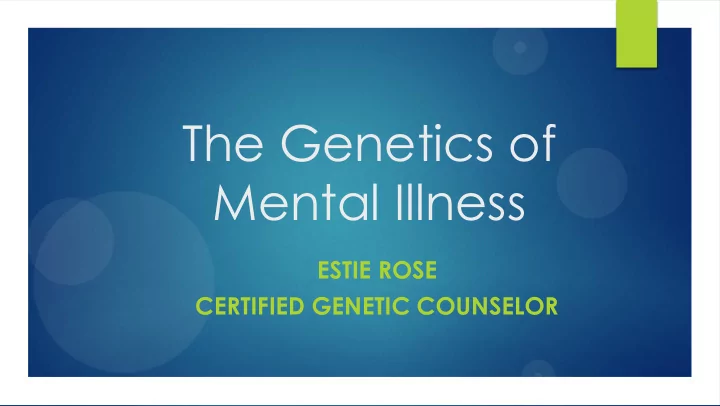

The Genetics of Mental Illness ESTIE ROSE CERTIFIED GENETIC COUNSELOR
Overview PART 1: Inheritance pattern of mental illness Types of psychiatric illness Recurrence risks Is there a Jewish genetic component? PART 2: Living with Mental Health Challenges, by Dr. Michelle Friedman PART 3: Marc Fein: Reflecting on Personal Experiences
Monogenic Diseases Result from a mutation in a single gene Easy to do genetic testing Ex: Cystic fibrosis, hemophilia, neurofibromatosis, Connexin-related deafness
Multifactorial Diseases Strong correlation to disease Weak correlation to disease Environmental Result from the effects of factor multiple genes or genes in combination with lifestyles and environmental factors Ex: Diabetes, disease correlation to Moderate Genetic variant 1 Genetic variant 2 heart disease, mental illness Weak correlation to disease Weak correlation to disease
Development of a Mental Illness From NSGC.org
Examples of Mental Illness ▪ Mood disorders ▪ Impulse/Control disorders ▫ depression, bipolar disease ▫ attention deficit hyperactivity disorder, kleptomania, compulsive ▪ Psychotic disorders gambling, addiction ▫ schizophrenia ▪ Personality disorders ▪ Anxiety disorders ▫ antisocial personality disorder, ▫ panic disorder, social anxiety, phobias paranoid personality disorder Eating disorders ▪ Obsessive-compulsive disorders ▫ anorexia nervosa, bulimia nervosa, ▪ Post-traumatic stress disorders pica ▪ Suicidal Tendencies
Mental Illness is NOT… Cognitive disability Dementia (Alzheimer’s) Parkinson’s Autism
How common is mental illness in US adults? In 2012, there were an estimated 43.7 million adults aged 18 or older in the U.S. with mental illness. This represented 18.6% of all U.S. adults Major Depression 6.9% Schizophrenia 1.1% Anxiety Disorder 4.1% Obsessive Compulsive Disorder 0.5% From National Bipolar disorder 2.2% Institute of Mental Health
Other Forms of Mental Illness Acute -postpartum depression, PTSD Part of a larger syndrome -DiGeorge syndrome, homocystinuria, acute intermittent porphyria
Can you inherit mental illness? Yes, but it is not so simple bipolar anxiety depression anxiety bipolar anxiety d. suicide
Empiric Risk Data: Bipolar disease Population prevalence: 0.8-1.6% (approximately Heritability: ~60% ▪ ▪ 1%) Early age-at-onset might indicate increased risk to ▪ Risk to first-degree relatives: relatives; female relatives at highest risk for any ▪ For bipolar disorder 5-20%, relative risk 7-10 affective disorder. During postpartum period, women For unipolar disorder 8-28%, relative risk 2-3 at increased risk for developing subsequent episodes. For any major affective disorder 20-30% Commonly comorbid disorders ▪ Risk to offspring with one parent affected with Alcohol and drug use ▪ either bipolar, unipolar, or schizoaffective disorder is Anxiety disorders 27% (i.e., risk is 27% to have any of the three Disorders that may occur more frequently in family disorders) members (note: this does not necessarily indicate shared genetic etiology) Risk to offspring with both parents affected by ▪ Unipolar depression bipolar disorder: 50-65% risk for bipolar; 50-75% risk Schizoaffective disorder for any affective disorder Cyclothymia Alcohol and drug abuse Risk to second-degree relatives: 5% ▪ Eating disorders From National Coalition ADHD for Health Professionals Anxiety disorders Education in Genetics
Genetic Testing Not really done Diagnostic Predictive For personalized medicine However, a genetic counseling consultation may be helpful to families who are affected
Find a local genetic counselor @ www.NSGC.org You don't need to have genetic testing in order to benefit from genetic counseling
Jewish Link to Mental Illness Not particularly common in the Jewish community, but just as common as it is in all populations (which is common!) From National Alliance on Mental Illness
Schizophrenia in the Jewish Community • Ashkenazi Jews who have one of two variations in the NDST3 gene are 40 % more likely to contract a schizophrenia- related disorder than those without it • The same variations increased the risk by only 15% in other populations Haaretz, Nov. 26, 2013
It’s ok to ask for help
Funding for this series is provided in part by: . . . A generous grant in honor of Beatrice Milberg
Recommend
More recommend